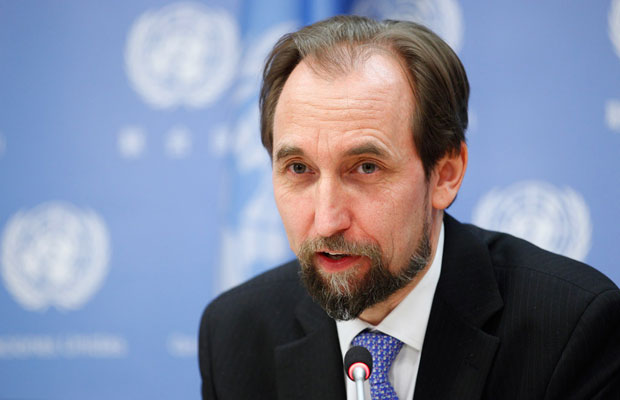UN High Commissioner for Human Rights Zeid Ra’Ad Al-Hussein on Friday weighed in on the Apple-FBI dispute, asking U.S. authorities to proceed with great caution. The legal fight centers on a court’s order that Apple help the FBI access encrypted iPhone data to aid its investigation of the San Bernardino terrorist attack.
Such a move could lead to crackdowns in various authoritarian countries, Al-Hussein said.
“In order to address a security-related issue related to encryption in one case, the authorities risk unlocking a Pandora’s Box that could have extremely damaging implications for the human rights of many millions of people, including their physical and financial security,” he contended.
Legal Wrangling Ahead
The case is far from settled. Apple has appealed the order, and a hearing is scheduled later this month in a federal court in northern California.
In the meantime, everyone involved should consider the wider implications of such a decision, Al-Hussein urged.
The San Bernardino attack was an abominable crime, he acknowledged. A husband and wife who were ISIS sympathizers killed 14 people and injured 22 in a mass shooting.
Everyone should support the FBI in its investigation, Al-Hussein said.
However, the issue at hand has ramifications that extend beyond this one case and this one particular company, he pointed out.
“A successful case against Apple in the U.S. will set a major precedent that may make it impossible for Apple or any other major international IT company to safeguard their clients’ privacy anywhere in the world,” Al-Hussein cautioned.
Those big picture concerns beg the question of how the FBI should carry out its investigation of the San Bernardino case. Would some type of compromise be possible if the iPhone at the center of the controversy contained valuable evidence?
“That’s a big ‘if,'” said Rupert Colville, a spokesperson for the commissioner.
“There may be nothing of interest on the phone,” he told TechNewsWorld. “People have been investigating and solving crimes long before the invention of the smartphone.”
Rogue States
Foreign governments have pressured Google and BlackBerry to expose their customers through mass surveillance, Al-Hussein pointed out.
BlackBerry last year threatened to exit Pakistan rather than comply with the government’s demand for access to its servers, he recalled.
China has pressured Google to censor its search engine, Al-Hussein added.
The Pakistan Telecommunications Authority requires prior approval for the use of VPNs and encryption, he pointed out, citing a 2015 report on the role of encryption in human rights.
Buba (Germany’s central bank) requires regulatory authority for those using encryption, the report notes.
China reportedly requires that encryption products adhere to government-approved algorithms that have not been peer reviewed for security.
Officials in the U.S. and UK have advocated creating backdoor access to encrypted devices. Other countries like Bolivia and Brazil prohibit anonymous speech, according to the report. In Iran, all IP addresses inside the country must be registered, and cybercafe users must provide their real names when using a computer.
Advocates back UN
Privacy and human rights advocates echo many of Al-Hussein’s concerns.
“The high commissioner is right to raise concerns about the serious global human rights ramifications of this case,” maintained Jamil Dakwar, director of the ACLU Human Rights Program.
A particular worry is “the risk of helping authoritarian regimes,” he told TechNewsWorld, “as well as the threat to privacy and cybersecurity for millions around the world.”
There are several important issues related to the debate between Apple the FBI, according to the Electronic Frontier Foundation. Among them are First Amendment implications, privacy rights, human rights and democracy.
“We believe that compelling Apple to build a backdoor for its own product actually undermines the security and personal safety of millions of Americans and others around the world, especially those living under authoritarian regimes,” spokesperson Karen Gullo told TechNewsWorld, “by creating the legal precedent, by weakening the trust users have in software updates supposedly authorized by companies, and by building the technology itself.”






















































